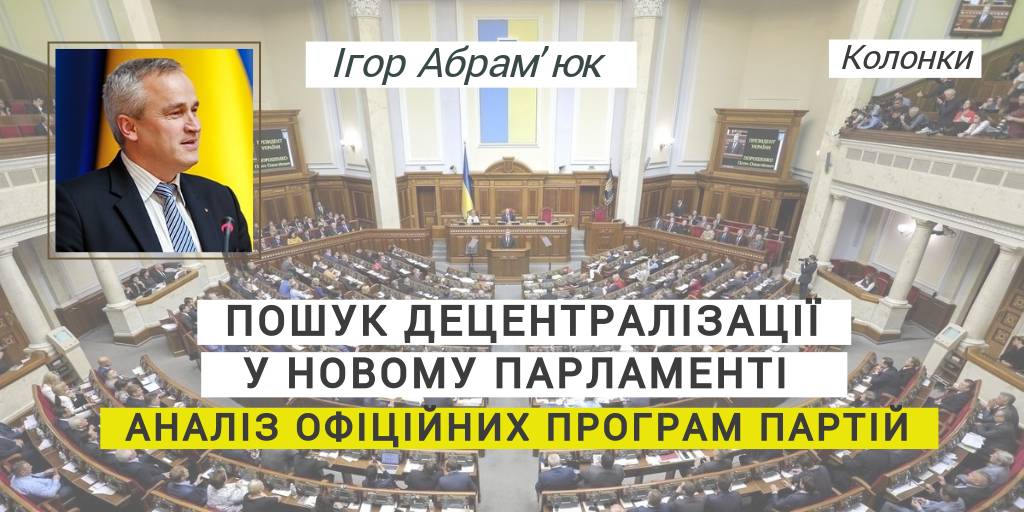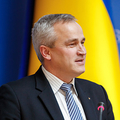Search for decentralisation in new parliament. Attempt 2: analysis of official party programmes
By Ihor Abramyuk, expert on local and regional development
Re-analysis of official versions of programmes (submitted to the CEC) by some of the leading political parties in terms of decentralisation, self-governance and territorial reforms.
A month has passed since my first attempt to analyse the party programmes in the article “Fate of decentralisation of the new political reality”.
The situation has now simplified: the parties filed documents for the CEC to run for early parliamentary elections, and therefore we have official versions of election programmes.
As the first time, the analysis focused on the programmes of those parties and politicians who, according to sociology, have the most real electoral prospects, as well as those that (to my subjective opinion) have a significant impact on the course and prospects of decentralisation.
Analysis of party programmes
In order not to replicate information and not to make the text too cumbersome, I put the excerpts from the party programmes in a separate annex table (DOWNLOAD). Therefore, I recommend everyone not acquainted with the first article to look through it, and then go back to this one.
“Servant of the People” party programme (Zelenskyy’s)
The new power party decided not to supplement or change anything – the wording remained the same.
And one more detail: with other parties, it is usually clear who will personally deal with decentralisation. Instead, it is unknown who will lead this important direction in the President’s party. The newly formed Presidential Office has the Directorate for Regional Policy and Decentralisation – and that's great. But exact responsible persons have not yet been voiced. Therefore (given the very high rating of the party), we have reasons for the worries about the fate of reform number 1.
“Holos” (“Voice”) party programme (Vakarchuk’s)
The official version of the programme does not include any provisions on decentralisation and reform No 1. However, the programme has a link to its full version, that has relevant abstracts and which remained unchanged.
Programme of the European Solidarity party (Poroshenko’s)
Compared to the 2015 programme analysed the previous time, the pre-election party programme contains a rather scant formulations on decentralisation, which is also surprising.
In addition, the wording “completion of decentralisation and further implementation of administrative reform” seems not entirely correct. It’s rather worth talking about deepening decentralisation and completing the administrative-territorial reform.
Nevertheless, party leader Petro Poroshenko continues to speak convincingly about reform No 1 from all the platforms, and therefore we will assume that programme wording reticence does not mean the lack of intentions to continue the reform.
Programme of the "Ukrainian Strategy" party (Groysman’s)
The programme of the party has not undergone any changes compared to the version subject to the analysis in the first article. And this is not a problem, since it had the necessary wording.
In fact, the phrase on necessity of making amendments to the Constitution, has not appeared in the programme, but party leader Volodymyr Groysman continuously emphasises this in his public speeches.
"Civic Position" party (Hrytsenko’s)
There is not a single phrase at least somehow relating to the subject of the analysis in the election programme of the party. And this is despite the fact that the former programme (which, by the way, is no more present on the party website), had well-developed and qualified formulations on decentralisation. The text of the new programme has no “decentralisation”, “self-government”, “administrative and territorial structure”, etc. terms.
"Power and Honour" party (Smeshko’s)
The programme of the party includes provisions familiar with the pre-election programme of the presidential candidate Ihor Smeshko – somewhat reformulated and abbreviated, but practically identical in content. It covers decentralisation, territorial reform, and division of powers quite substantially.
On the whole, it can be said that in terms of decentralisation, this is one of the best party programmes.
“Batkivshchyna” (“Homeland”) party (Tymoshenko’s)
As in the election programme of presidential candidate Yulia Tymoshenko, the party programme does not mention anything about decentralisation and has no link to the ongoing reforms – there are no “decentralisation” and “self-government” terms at all.
"Opposition Platform for Life" party (Medvedchuk – Rabinovych’s)
The programme of the Opposition Platform, as expected, in its content does not differ from the election programme of Yuriy Boyko, which was the subject of analysis in the first article. Therefore, the party programme repeats the phrase on direct elections of regional leaders. In addition, a new and no less dangerous idea of transition to a parliamentary republic appeared.
“Opposition Bloc” party (Vilkul’s)
The programme of the party (as well as the previously analysed programme of presidential candidate Oleksandr Vilkul) contains fairly comprehensive mentions on decentralisation and self-government. The wording is even wider – obviously because the Oppobloc was joined by the “party of mayors” of Kernes-Trukhanov. At the same time, it goes about “entire decentralisation”, when all PIT, the whole environmental tax, all rental payments and excises remain on the ground. All this was supplemented by more than three quarters of the corporate profit tax. It is unlikely that programme creators were thinking about what would happen to the state budget, while proposing such a radical redistribution of budget revenues. The programme gives a clear view of what reforms Oppobloc considers “anti-popular”: pension, healthcare and educational one. There is no decentralisation among these reforms.
The party declares its intention to establish a two-chamber parliament and abolish “anti-popular” reforms – we see a clear desire to put a serious revision of state policy and state system.
The full version is available in Ukrainian – please click HERE

06 February 2026
Акселераційна програма Clusters4Regions: новий етап розвитку кластерного менеджменту в Україні
Акселераційна програма Clusters4Regions: новий...
2 лютого розпочала роботу Школа кластерного менеджменту #Clusters4Regions — акселераційна навчальна програма...
06 February 2026
Анонс: як Україна адаптує місцеве самоврядування до стандартів ЄС — підсумки проєкту ЦППР
Анонс: як Україна адаптує місцеве...
Система місцевого самоврядування та територіальної організації влади в Україні зіштовхується з викликами воєнного...
05 February 2026
Міжнародні програми підтримки громад: гід можливостей для відновлення та розвитку
Міжнародні програми підтримки громад: гід...
Matchmaking сесія під час Impact.Zhytomyr 2.0 Forum Автори: Ярослав Жидик, асоційований партнер...
05 February 2026
Час на якість: що дає громадам відтермінування містобудівних дедлайнів
Час на якість: що дає громадам відтермінування...
У попередніх матеріалах ми говорили про «страх підпису» у відбудовчих проєктах — явище, з яким сьогодні стикаються...
